- Home
- Adam Thorpe
Between Each Breath Page 29
Between Each Breath Read online
Page 29
Tallinn was very noisy after the island. We decided to walk to where you could see over the Bay of Finland. It was like an operatic backdrop. Her eyelids were swollen and red, again. She hugged me and whispered in my ear.
Is this real life? Will you take me with you?
We held each other for a very long time. My mouth was in her hair. I’ll come back for you, I wanted to say.
She realised, suddenly, that we hadn’t exchanged addresses. This procedure seemed to belong to another, duller world. We scribbled under a dim street lamp, we exchanged the scraps of paper.
Then she walked away without looking back. It was like a bit of me tearing off.
‘I’ll drop you a line!’ I shouted, waving the scrap of paper.
She turned round: too far away perhaps.
‘What?’
‘I’ll drop you a line!’
She didn’t understand the phrase, I could see that. I wondered why I’d even used it. I gave the kind of wave you give from high up on the deck of a ship, and then she understood only too well.
Too far away.
SEVEN
Jack was in Howard’s spare room, off the living room, and it was very small. A box room, as it would once have been called, but not shaped like a box: it was narrow, not much wider than a single bed. Howard’s computer sat on the table, beyond which was the spare bed. The door could never be fully opened because of the desk and chair. Jack was sitting in the chair, his head resting against the closed door. A little inclination of his head would bring his eye or his ear to the keyhole. He felt ridiculous.
Before Jaan arrived, while Howard was making coffee to sustain the spy, Jack had pointed out how interested Kaja had been in his work.
‘We talked a lot about my work. She reckoned the biggest thing in life is to be honest to your self. To your inner soul. That kind of thing. Not to block yourself. You know, the way people take a crap job so they don’t have to write the concerto or the great novel or try to paint, or whatever. Yes, they have to earn a wage, but… maybe they don’t need to …’
Howard had laughed. ‘When were you last strapped for cash, m’boy?’
‘I’m questioning myself, Howard.’
‘Go ahead, then. Starve in a garret. I mean, eat vegan in your designer loft space, man.’
He’d laughed again, then stared at Jack with his serious expression, similar to a scowl. It had rained in Colombo, fortunately. A sudden squall. They hadn’t missed much.
‘This is no joke, Jack. We’re trying to go forward with minimal damage. She’s waiting for you to invite her over. Them over. We don’t want her to feel uninvited. Or uninviting. She might then force the pace.’
‘As Schoenberg said, there are masterpieces –’
‘Still to be written in C major, yes, and what a pity Schoenberg didn’t write them. Hm?’
Now Jack’s coffee was sitting in front of him, turned cold. He could hear fairly clearly through the door, but the keyhole offered only a very partial view. The lesson was half over. He thought of the lessons he had given and how much better Howard was at explaining things. Jack remembered a lesson with his piano teacher when he was ten or eleven and already very advanced: they had been working on Satie, on the first Gymnopédie. His piano teacher, Clara Knowles, who soon afterwards contracted multiple sclerosis, told him that the key to these pieces was Satie’s use of résonance (which she said in French, because she was originally Belgian). She played the E and showed him how its echo went on for nine beats, through which the other notes played off its résonance, and that unless he pressed the E hard enough all the simple beauty of the effect would be lost. Too hard, however, and all Satie’s gentleness and sadness and nostalgia would be lost. It was a question of getting le juste milieu.
Then she played the E and sure enough it continued like the string of the beads of the other notes, and Jack felt a kind of deep thrill in his belly. The music he’d heard from the white clouds above Hayes was like that résonance of the E just audible under the notes at that moment being pressed from the piano and vibrating with or against them and giving the experience all its beauty. But it took him the rest of the lesson to get it right, and then it was not as beautiful as when Clara played it. He was half in love with Clara, anyway, who had a mane of jet-black hair she kept tossing to one side and, if Jack was on that side, it would hit his face in a quite painful but delicious way, but she never noticed because he wanted it to happen again and so he didn’t even flinch.
‘It’s like throwing a ball just the right distance,’ she said. ‘You throw balls, don’t you?’
Jack nodded in the box room, as if Clara was asking him right then and there. He would have liked to have told her, now, that Pärt used the same device in Für Alina, but she was beyond anything, beyond silence even. Jaan was hardly speaking in the room next door, or if he was speaking he was speaking very softly. Howard’s deep voice rumbled away. He was a permanently lean-forward person, all but bossy, and this could irritate Jack to the point where he would wonder why he was Howard’s friend at all.
Kaja had sent Jaan up without coming up herself, and as she sometimes collected him without appearing in person, Howard had explicitly asked her to come and see him at the end of the lesson. Jack and he had worked out what questions to weave into the conversation, which would be mainly about Jaan’s progress.
There was a large framed photograph of the Queen in full mink-and-diamond regalia above Howard’s desk, taken many years ago. She seemed to be wondering what on earth one of her subjects was up to.
Jack closed his eyes. It had been Howard’s suggestion, this. Howard’s wheeze. To boil the maybe down to something hard and certain. Probably.
After a moment with his eyes closed, he thought: this is how my mother experiences life all the time. To Mum, life is always a box room with voices. A box room, because the limits of her secure space are the stretch of her hands. He stretched out his own hands and knocked something over on Howard’s desk – a pencil holder, which spilt its contents with what sounded to Jack like a gunshot. He froze, but Howard’s voice carried on and then Jaan played a passage of an étude on his viola to a one-handed accompaniment on the piano.
Jack found it hard to entertain the idea that he was the father to the boy playing the viola, the sound slightly muffled by the door. His feelings were not as he might have expected them to be, and therefore he supposed that Howard’s subtle probing would reveal the truth – which would be that the father was another lover, possibly the man whose name Kaja now carried but whose status as a ‘great musician’ had been exaggerated, or who had never achieved proper recognition. Maybe he had died tragically, as Clara Knowles had done – not in an accident but slowly and horribly, hoping right up to the end for a cure.
Because hope was the résonance that made life possible and poignant and beautiful; especially when life – or death – was in counterpoint to it.
He looked through the keyhole, but Jaan’s bobbing elbow was still the only part of him visible. He calculated that his width of vision was about five or six feet. They had experimented earlier: Howard had placed a chair in the middle of Jack’s field of vision. If Kaja didn’t sit there, or if she moved about, he wouldn’t see her. He imagined her suddenly opening the box-room door and finding him there, crouched down with one eye squeezed tight. She would probably laugh. He hoped she would laugh.
He felt quite cool about the prospect of spying on her, but nervous about what she might say in answer to Howard’s probing.
It was hot in the box room; in winter it would be even hotter, as the radiator was too large and Howard liked to go about all year with summer clothes on, inside, so he kept the heating high. Sometimes you would find him in shorts in December. Milly hated that sort of behaviour, it was American and criminally selfish. It reminded Jack of Kaja’s parents’ apartment on Haaremaa. Sweat was dripping down from his underarms onto his ribs. He had put on a smart shirt, just in case, but he’d have been better off in a T-shirt
. The window was closed, to keep down the noise – there was a pneumatic drill going somewhere and the usual trundle of London. He didn’t want to miss a word.
Jaan’s shoulder and his bow-hand came in sight, but however Jack twisted his head nothing more could be made out. Then the lesson was over and Howard’s legs could be seen, close, diminishing as they walked towards the table where the vital chair was placed. Jaan came fully into view for a few moments. Yes, he looked like Mikhel, Kaja’s father. His face proved nothing. Lots of people had black hair. Maybe fewer in Estonia, but…
‘The toilet, please,’ he said.
‘Go ahead, buster. Put it back when you’ve finished with it.’
Jack watched Jaan smile uncertainly up at Howard for a moment and then limp off. That uncertain smile, the face craned up, shipped the onlooker with a warm feel. It surprised him. It was because he knew exactly what that uncertainty felt like and how terribly tall the adults were.
Howard turned and gave the box-room door a wink.
There was the buzz of a bell. After what seemed a very long time, Howard appeared again, talking, holding the chair like a waiter.
‘I’m OK standing,’ came Kaja’s voice.
She was off to the left, out of sight. Perhaps there was just the edge of a knee. Jeans, maybe. Jack’s back was uncomfortable and he found it hard to breathe easily in this position. He should have kneeled, he should have tested the whole thing better. Howard was off to the right, half of him visible lengthways.
Howard was saying: ‘He’s making very good progress. He’s rather exceptional, we’re agreed. I hope you don’t mind me knowing a little more about his background.’
‘People, you mean? Or the scenery?’ said Kaja, as if it was a caustic joke.
Howard smiled. ‘Both?’
‘OK.’
He recognised something had changed about Kaja’s voice, now he could hear it live and not on what had been a poor line. Then, at the same instant Jack smelt it, he knew: she was still a smoker. More of a smoker, since she’d hardly smoked more than one or two a day when he’d known her. She was smoking and, as far as he knew, she hadn’t asked Howard’s permission. Howard didn’t like smokers, but nothing was said. Then Jack saw the cigarette in her hand, which was thrust forward into his keyhole view. Those were the tapering fingers that had touched him intimately. Those were the knuckles he had enclosed with his lips.
‘Well,’ said Kaja, in her huskier voice, ‘does it matter, in fact?’
‘It would help me. Are you sure you won’t sit?’
‘I’ve been sitting all day. It feels like it. The traffic is bad. I sit on the lower deck because, I don’t know, I feel safer.’
The hand disappeared and then reappeared, and smoke misted the space behind it. The jeans knee showed a bit more of itself: it was in a jeans skirt. It retreated again. Jack took a long breath to calm himself down.
‘For instance,’ said Howard, ‘was his father a jazz musician? I mean, was he good at improvisation? Was he spontaneous and inventive?’
‘Why?’
‘Because it would help me to know in which direction –’
‘My son is as he is. Do you believe in musical genes or something?’
This was a more aggressive Kaja, a more impatient Kaja. An angry Kaja, underneath. Had he made Kaja into this? Then her face suddenly came into view, dipping towards an ashtray that Howard had placed on the table; her face staying for a moment and then vanishing back. It was the same face and a different face: her full head of hair was piled up loosely on top, like something from a Greek vase, coils falling in front of her ears. It was not quite the face he’d held all these years in his memory. It was both startling and reassuring. It was still beautiful, in his opinion, if slightly thinner. He felt confused and anxious. He didn’t think he was in love with her any more.
‘It’s more a case,’ said Howard, as if he’d been reflecting deeply, ‘of unconscious influences. I don’t even know if Jaan knew his father. Now I don’t want to probe, but for all I know he may have heard his father play the viola, for instance.’
‘He heard me play the violin,’ Kaja laughed. ‘That’s why he chose the viola!’
‘Negative attraction,’ Howard grinned, clearly enjoying himself.
‘I never made him play music. I never pulled him into it. He heard the viola on a CD and said he wanted to play it. I thought he would start on the violin, but he protested really a lot. On Haaremaa there was this nice viola teacher in her sixties, with a holiday house. She had to bring a junior viola from Tallinn, for us to hire. Then Jaan was so quick to learn she taught him for free, whenever she was over in the island.’
‘Amazing,’ said Howard. ‘Must have been the genes.’
Jaan appeared between them. She folded her arms over her son’s chest as he rested back against her skirt. The fag must be in her mouth, Jack thought. Sure enough, an arm disappeared and the space misted with smoke. That’s not good for the kid. That’s not good at all.
‘He never knew him, by the way,’ said Kaja.
The boy twisted his head up and said something in Estonian. Kaja replied, rubbing Jaan’s chest with her hand. Jack felt alarmed at life, suddenly, and what might be about to happen. The pneumatic drill started up again, faint through the shut window. It was much too hot.
‘What’s he saying?’ said Howard, smiling affectionately.
‘He asks if we are talking about his father,’ said Kaja, with an ironic lilt that Jack found attractive.
‘And we are. Or trying to,’ said Howard, nodding at the boy.
‘My philosophy,’ said Kaja, ‘is that you look forward, not back. If Estonians look back they see a lot of shit. If English look back they see a lot of nice things.’
‘Not all nice,’ said Howard.
‘They think it’s nice,’ said Kaja. ‘We can’t think it’s nice because it’s like barbed wire growing into a tree. The wire doesn’t grow but the tree does. By the way, this is a poet who’s saying this, a famous poet, not me.’
‘A very striking image,’ said Howard, ‘but clearly it suggests that your personal memories of the crucial liaison were rather painful.’
‘There’s nothing I want to say without Jaan understanding it,’ said Kaja.
‘OK, agreed, yes,’ said Howard, sounding bereft of ideas.
‘I’ll tell you what I’ve said to him,’ said Kaja, after the cigarette had briefly disappeared again. ‘I’ve said that his father went away before he was born.’
‘Away?’
‘Back.’
‘Back?’
A silence.
‘So, the father wasn’t a viola player. But he might’ve been a rock musician.’
Kaja laughed. It was good to hear her laugh.
‘You are really mad, Mr Davenport. Anyway, you know it already, what you’re trying to find out. It’s like the KGB, they would always ask what they knew already.’
Jack was resting his ear against the door. All he could think of was a technical phrase of Milly’s: life-cycle cost.
‘Why do you think I know already?’ said Howard, clearly taken aback.
Kaja’s hand tousled her son’s hair.
‘I’ve said too much things. It doesn’t matter. Was Jaan fine today?’
Jack, while Howard was passing on his lesson notes, remembered arriving in a village with Kaja one morning – one of the tiny, rebuilt, half-deserted villages of the island – and seeing some six or seven young lads playing football on the local pitch, between a cemetery and a litter-strewn wood. The lads had politely invited them to play. Kaja was tired from cycling and watched from the touchline. The pitch had ruts in it, and the odd rusty bit of metal sticking up an inch or two, but Jack had a lot of fun, pretending to play well in front of his girl and scoring a goal.
Afterwards he’d felt desperate to have a son, but had said nothing about it to Kaja.
Jaan was leaning with his elbows on his mother’s knee, his bad foot at an awkward angle –
but that was probably coincidence. Jack had no memory of leaning against his mother’s knee. He must have done, though.
He rested his head quietly against the door, picturing himself taking Jaan up to the Heath and kicking a football about. He experienced a sense of life’s complications – a kind of abstract mesh drawn over his mind. He didn’t like the blackness of Jaan’s hair, or the way it fell over his ears and across his brow. But he loved the way the boy leaned awkwardly like that, his chin in his hands, moving his hips from side to side until his mother stopped him. Dreamy. Very tall adults.
Kaja was in keyhole shot again: she looked much the same as she had six years ago. A little thinner, that’s all. And standing in front of her, very serious now he had broken away from her knee, was her son. Who was quite likely his son.
And he was spying on them.
And then, looking at a sheet of paper – maybe a score – that Howard had given her, she put on a pair of black, oval glasses.
‘A cup of tea?’ offered Howard, as per the script, although rather later than planned.
‘No problem. I am so thirsty,’ she said, nodding like a studious schoolgirl in her unappealing glasses.
‘Do you think you can be a Christian and as well believe that the Passion is just a symbol of private suffering, a kind of poem? Just that?’
‘You mean,’ said Howard, ‘nothing really religious, just a metaphor?’
‘Yes. A metaphor. Not of God’s purpose, but of our situation here on earth.’
‘That’s your view, is it?’
‘It’s you I asked the question to. So, what do you think?’
She was finally sitting in the right chair, the one with a slung canvas seat, full in Jack’s view. She had on a jeans skirt and bright pink tights and black sandals. Her short-sleeved top, buttoned at the back, was a yellowy cream and kept her shoulders bare. Jack was surprised to see a violet ink-stain on her right shoulder, just above the shoulder blade: in fact, he realised, it was a tattoo, some sort of heraldic dragon or bird. She had crossed her legs. Jack could mainly see her back and her hair. There was a wooden farmyard and animals on a shelf in Howard’s bedroom – a childhood souvenir – and Jaan was in there playing with it. This had also been planned. It meant that Jaan was out of earshot. She had taken her glasses off, he reckoned.

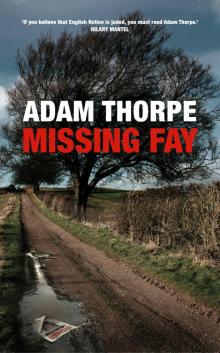 Missing Fay
Missing Fay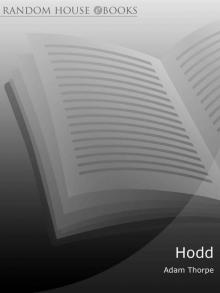 Hodd
Hodd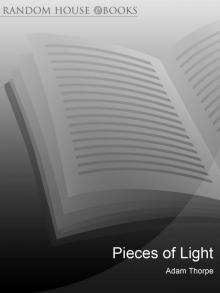 Pieces of Light
Pieces of Light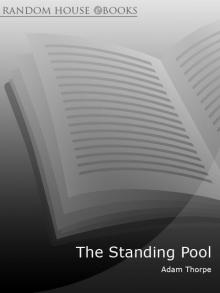 The Standing Pool
The Standing Pool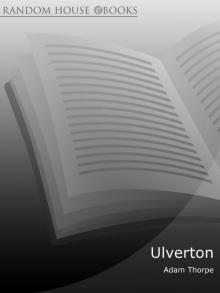 Ulverton
Ulverton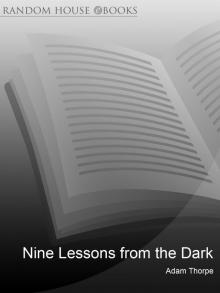 Nine Lessons From the Dark
Nine Lessons From the Dark Flight
Flight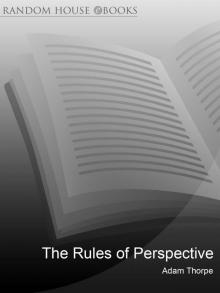 The Rules of Perspective
The Rules of Perspective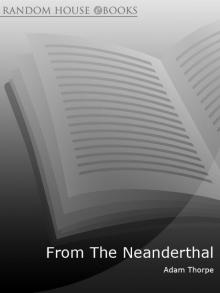 From the Neanderthal
From the Neanderthal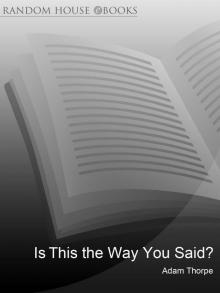 Is This the Way You Said?
Is This the Way You Said?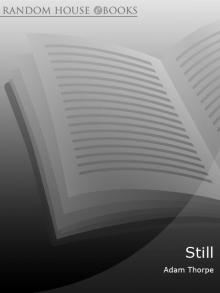 Still
Still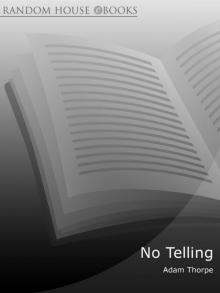 No Telling
No Telling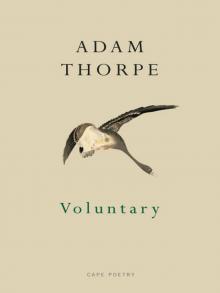 Voluntary
Voluntary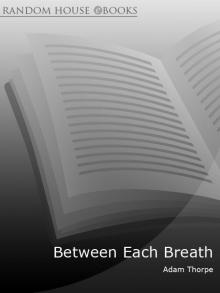 Between Each Breath
Between Each Breath